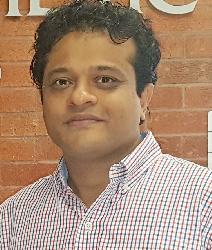Faculty Directory

- Title
- Dr.
- Division Physical & Biological Sciences Division
- Department
- Physics Department
- Phone 831-459-5010
- Office Location
- Interdisciplinary Sciences Building, 290
- Mail Stop Physics Department
Research Interests
I work in the broad fields of astrophysics, reforming science education and in developing techniques for image deconvolution in optics.
My publications provide analytical solutions to problems in astrophysics and optics that have remained unsolved for decades. These papers provide models for reconstructing the unknown 3-dimensional density profile of a wide range of (inaccessible) systems, from their observed 2-dimensional images, with relative (fractional) errors as low as one in a million. The models apply to the broader area of image deconvolution in optics where they can be applied to several problems in remote sensing, including analysis of numerous biological systems. In fact, under noise-free conditions, these models yield solutions for reconstructing the 3D structure with errors that are 1200—58,000 times lower than several state-of-the-art computing programs. The papers also show how we can accurately model the surface brightness profile of a wide range of elliptical galaxies with unprecedented accuracy, discover hidden components in their structure, unravel possible imprints of the effects of dark matter on the profiles of massive galaxies, and present an alternative explanation to the “mass deficit” problem seen in massive galaxies.
I am also passionate about researching ways for reforming science education to make it exciting, interesting, and relevant for students. I work on discovering tools that would—prepare students for the challenges presented by the rapidly changing working environment, unravel learning barriers, and make science education fun, inclusive and accessible to students across the board.
If any of these broad areas interest you, please feel free to write to me and I will be happy to discuss possibilities for collaboration. This applies to undergraduate students as well. I have worked on interdisciplinary research projects with students and will be happy to discuss opportunities for working on data-driven projects in science as well as in reforming science education.
Biography, Education and Training
Ph.D. (Physics), University of Minnesota-Twin Cities
(docotoral thesis in astrophysics)
Selected Publications
The following publications contain the technical details of the description under "Research Interests":
2. Deconvolving signals of the stretched exponential form: Dhar, B.K.
3. Surface brightness and intrinsic luminosity of ellipticals: Dhar, B.K. & Williams, L.L.R.
4. Characterizing the multicomponent density structure of galaxies: Dhar, B.K.
